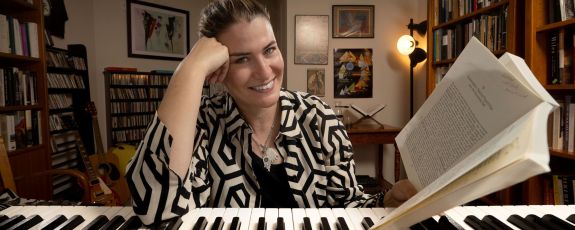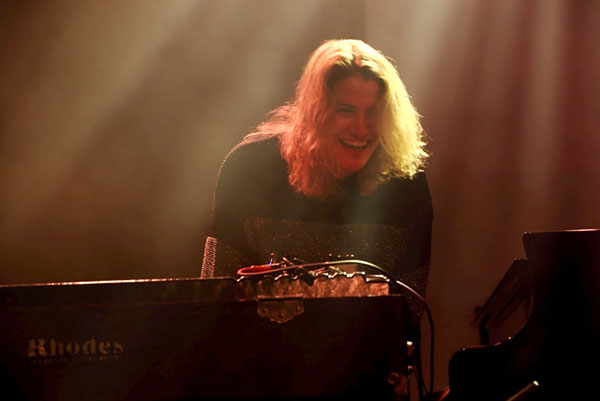
Literature Professor Is Winning Acclaim for Her Jazz
Maya Kronfeld’s music enhances her scholarship on literature, philosophy and jazz
“It was really easy to play with that rhythm section,” Kronfeld said. “You have Christian McBride on bass, and Dan Pugach on drums. Sometimes it’s all about the chemistry with the rhythm section. It was easy to sound good with these guys. The joy of collaboration in that band is so supreme. That’s what it’s all about.”
Kronfeld said How Love Begins was recorded at the Sound on Sound studio in Montclair, NJ, in 2021 during her post-doctoral fellowship at the Princeton Society of Fellows, where she was also teaching comparative literature.
Kronfeld noted that the area is a “jazz hub” that includes McBride’s “Jazzhouse Kids,” a community arts organization dedicated to educating young people through jazz, according to its website.
How Love Begins was produced by McBride, an acclaimed, eight-time Grammy Award-winning bassist and composer, “who will incidentally be appearing at Memorial Hall at UNC-Chapel Hill next week with his band,” Kronfeld added.
Kronfeld said she met songwriter-singer Zuraitis “many years ago” in New York. She was at the Princeton Society of Fellows when Zuraitis asked her to collaborate on How Love Begins.
“It was such a special opportunity for me,” Kronfeld said. “Nicole [Zuraitis] said, ‘I need your sauce.’ That was so sweet of her.”
Prior to nabbing the top best jazz vocal album at the 66th annual Grammy Awards, How Love Begins spent four months on the top 20 on the Jazz Week Radio charts. It was also featured on Downbeat Magazine’s Best of 2023 list and Sirius XM’s top jazz albums for 2023, according to Zuraitis’ website.
Kronfeld began playing piano professionally while she was still in high school in Berkeley, California. In a September profile for Trinity College, Kronfeld pointed to a coming-of-age period guided and informed by her Israeli parents’ involvement with academia, music and activism for justice in Israel/Palestine.
Kronfeld’s “rhythmic orientation” under the tutelage of her drummer father influenced her first published scholarly article, “The Philosopher’s Bass Drum,” in 2019.
The essay explores the politics of rhythm in jazz and critically engages the aesthetics of German philosopher and musicologist Theodor Adorno, who “notoriously asserted” in 1936, that “jazz can be easily adapted for use by fascism,” Kronfeld wrote.
Kronfeld has just completed a comprehensive essay on Immanuel Kant for the Johns Hopkins Guide to Critical and Cultural Theory, and her chapter for the Cambridge Companion to Philosophy and Literature defends the importance of verbal art for critical thinking, drawing on Virginia Woolf and Toni Morrison: “I talk about the power of the knowledge that is encoded in verbal art through its form — just like rhythmic form encodes knowledge in jazz,” she explains.
Last month, Kronfeld performed at the Winter Jazz Festival in New York City with one of her most treasured collaborators, multi-instrumentalist, composer, producer and creative activist Georgia Anne Muldrow. The performance was part of Muldrow’s “in-the-moment” series, a topic Kronfeld wrote about in her essay “Structure in the Moment: Rhythm Section Responsivity” for Jazz & Culture.
Kronfeld deeply treasures her keyboard work with world-renowned jazz pianist and composer Taylor Eigsti, who won the Grammy last year for Best Contemporary Instrumental Album. Eigst’s latest album, Plot Armor, which features Kronfeld along with a star-studded ensemble, will be released on March 1. The group plays Eigsti’s whimsical composition at break-neck speed in a recent live in-studio performance.
Kronfeld has also been active musically on the homefront. Last month, she joined N.C. Central University professor of percussion and jazz studies Thomas Taylor in a tribute performance for the pioneering jazz drummer Max Roach in Elizabeth City on the North Carolina coast. Roach was a native of Newland, about 20 miles northwest of Elizabeth City. He would have turned 100 this year.


“It was such an honor,” she said about playing at his centennial celebration. “Max Roach’s daughter, violist Maxine Roach flew down [for the tribute]. It was so special. My late father deeply respected Max Roach for his music and his activism.”
Kronfeld was an invited scholar-in-residence at the University of Pittsburgh’s Jazz studies department last fall. In Spring 2025, she will offer her Duke course “Conversations: Jazz and Literature,” where in addition to literary works, students will learn from the ways Black music innovators have theorized their own practices.
“I am excited to provide opportunities where performance practice and theoretical reflection are intertwined the way they have always been meant to be,” Kronfeld said.
While celebrating the album’s Grammy triumph, Kronfeld said she had a chance to speak with Zuraitis, who had had a whirlwind weekend of calls and interviews.
“I told her she’s handling it all incredibly gracefully, but now get some sleep,” Kronfeld said.